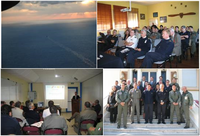REMPEC organized a Coordinated Surveillance Operation in the Western Mediterranean (OSCAR-MED) – Oct 12, 2009
A Coordinated Surveillance Operation in the Western Mediterranean (OSCAR-MED) was organized by the Regional Marine Pollution Emergency Response Centre for the Mediterranean Sea (REMPEC) between 12 and 16 October 2009 from the airbase of Hyéres (Toulon), France, in close cooperation with the French Préfecture Maritime de la Méditerranée.
This activity represented the first attempt in the Mediterranean region to enhance operational cooperation in combating illicit discharges and was aimed not only at ensuring an extended aerial coverage but also at exchanging information on the pollution detected among the different countries and at facilitating the process for a successful prosecution of the offenders in the region.
All the countries of the western Mediterranean basin had replied positively to this initiative and France, Italy and Spain confirmed their participation by rendering available a surveillance aircraft. Morocco, although initially willing to actively contribute to the operation, was not able to participate due to operational constrains. Monaco and Tunisia participated as observers.
Flights were performed within the survey area (along the axis Genoa – Barcelona) during both day and night hours between Tuesday 13 October (09 00 hrs local time) and Thursday 15 October (18 00 hrs local time).
The European Maritime Safety Agency (EMSA) supported the operation by providing through the CleanSeaNet service satellite images analysed for oil slick detection. Moreover, representatives from the Mediterranean Operational Oceanography Network (MOON) provided 24h assistance by developing oil spill drifting forecasts of the slicks detected by satellite and by the surveillance aircrafts.
Throughout the operation the following results were achieved:
- three oil spills which were detected by satellite were identified and confirmed by aircraft;
- the oil spill forecasting models were in some cases validated by observations made by the surveillance aircrafts;
- three ships were caught red-handed, two of them while discharging mineral oil within the French Ecological Protected Zone (EPZ). The two polluting ships are being investigated by the French authorities;
- fourteen observers attended the operation participating to the surveillance flights and contributing to a fruitful exchange of knowledge and expertise.
The OSCAR-MED operation, which represents the follow up of previous activities carried out by the Centre in the field of illicit discharges from ships, is perfectly in line with Specific Objective 6A of the Regional Strategy for the Prevention of and Response to Marine Pollution from Ships (“the Contracting Parties agreed to endeavour to establish, by 2010, sub-regional systems, including procedures to over-fly the waters under the jurisdiction of a neighbouring State if the Parties so agree, for surveillance of environmentally sensitive and/or high risk zones of the Mediterranean Sea”) and has fully demonstrated that regional cooperation, particularly in terms of surveillance and investigation, represents a key issue for combating illicit discharges in the Mediterranean Sea.
It was duly noted that this kind of operations should be carried out in the future on a regular basis and extended also to other areas of the Mediterranean Sea which are well known for being threatened by illicit discharges.
REMPEC is looking forward and willing to support the carrying out of other similar initiatives within the Mediterranean basin.


